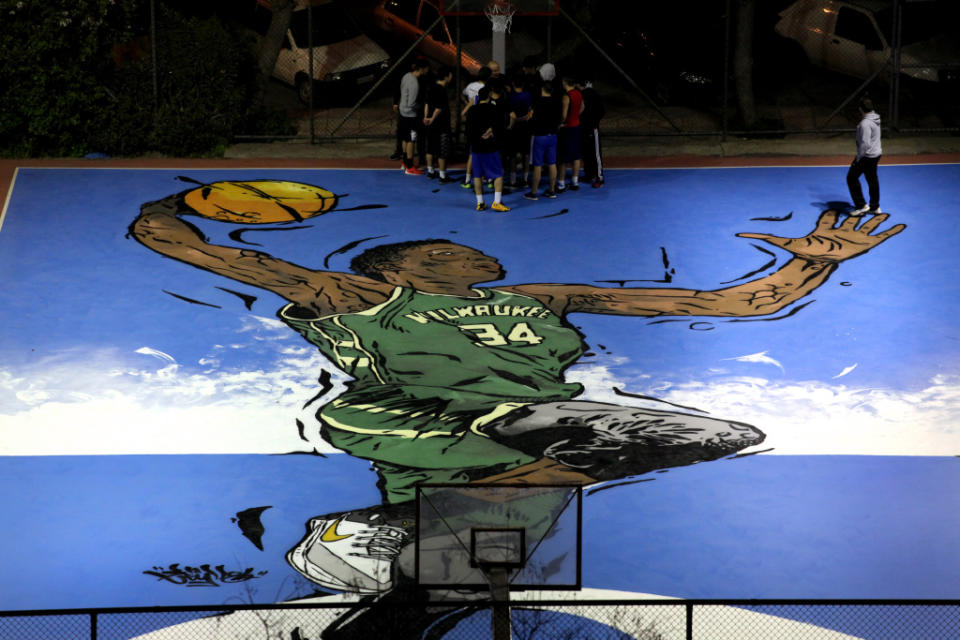In Athens, Giannis Antetokounmpo’s NBA triumph forces the ancient city to confront its past, and dream big
In a café in the central Athens suburb of Sepolia on Wednesday, owner Giannis Tzikas was popping champagne bottles. Giannis Antetokounmpo had just led the Milwaukee Bucks to victory in the NBA final against the Phoenix Suns, and Tzikas was celebrating with a small group of youths, some of them donning basketball gear.
An emotional Tzikas, who once gave Antetokounmpo free sandwiches from his café and encouraged him to keep up his training schedule on nearby basketball courts, sang the praises of the NBA superstar.
“He doesn’t owe anybody a thing. He did it all himself,” said Tzikas.
In Sepolia, like in much of Greece, Antetokounmpo is helping restore a sense of national pride. The country’s sense of worth took a beating during its ten-year economic crisis that seemed to be just coming to an end when the coronavirus pandemic hit early last year.

The downturn nearly hurled the country into bankruptcy and sent hundreds of thousands of Greeks abroad to find work. With the unemployment rate still hovering around 17 percent, job prospects for many remain weak.
Now, the child of Nigerian migrants, who for the most part lived in the country illegally, Antetokounmpo is helping Greece recover some of its lost self-confidence.
He is inspiring many in Greece, with his story of beating the odds to reach the top. His climb from a life of poverty and selling trinkets on the streets to survive to winning the NBA final and being crowned MVP is seen in Greece as being a national success.
After the game, Greek Prime Minister Kyriakos Mitsotakis sent out the pre-dawn tweet: “Incredible Yannis! Greeks everywhere celebrate!"
https://twitter.com/kmitsotakis/status/1417693229429018631
A victory for "everyone"
Labeled as a “world leader” and “legend”, Greek media said he is a role model the country needs.
Others say that his success goes beyond the world of sports, sending a broader positive message. At Melissa Network, an organization for migrant and refugee women from Nigeria and another 45 countries, director Nadina Christopoulou says that Antetokounmpo’s success “is not just about migrants or athletes, it is about everyone.”
“He has shown that anything is possible, that even in a country that gives no opportunities, and often thrives in exclusionary narratives and practices, hard work and dreaming against the odds is the only way forward,” she said.
A working class district
On the streets of Sepolia, however, conditions remain tough, particularly for members of the Nigerian community. A working class district, Sepolia draws migrants thanks to the low cost of housing and proximity to the city center. Like many downtown suburbs in Athens, it offers little in the way of sporting facilities, apart from the odd football pitch and basketball court. Bike lanes are a rare sight while joggers are often forced onto busy streets due to a lack of footpaths or double-parked cars.
Locals often blame crime-related incidents on migrants who moved to the area in recent decades, from countries such as Albania, Russia, and Romania, in addition to African nations.
In Sepolia, support for neo-Nazis Golden Dawn, a party which is now defunct, at 2014 municipal elections was among the highest levels seen in the Greek capital (at around 20 percent).
Living conditions for those from Africa remain difficult in Sepolia and the broader area. Out of the 40,000 African migrants estimated to be living in Greece, most are from Nigeria, and living in Athens.
Many from these migrant communities accuse many Greek employers of being racist and refusing to employ them, despite being qualified for the job. According to some estimates, unemployment among Africans and Nigerians in Greece is at around 85 percent.
"How migrants can help a community"
Nikodemos Maina Kinyua, head of migrants group Asante, told Fortune that Antetokounmpo's sucess has help changed the narrative on migrant's rights in Greece, shifting it to the contribution they make to the community. "This is increasing the focus on how migrants can help a community move forward," he said.
Others point out, however, that for the time being, the reality of being an African migrant in Greece remains harsh and unchanged.
Maria Ifechukude Ohilebo, who arrived in Athens from Nigeria 27 years ago, says that children in the Nigerian community look up to Antetokounmpo. Ifechukude Ohilebo, who took part in a movie portraying Antetokounmpo’s rag-to-riches story, said that children want to follow in his steps.
“But for the broader community, nothing much has changed,” she said.
In the sporting arenas across the country, the praise for the basketball player is endless but deep down there is a feeling that little will change at a grass roots level.
Antetokounmpo’s former coach at his division 2 Athens team, Takis Zivas, said that he doesn’t feel that his success will have any real impact on the game in Greece.
“The talented ones will continue to be sucked in by the so-called experts, while in Europe and the US they will roll out the red carpet for them. Just like in all areas, the talented kids in this country will leave,” he said.
This story was originally featured on Fortune.com

 Yahoo Autos
Yahoo Autos 